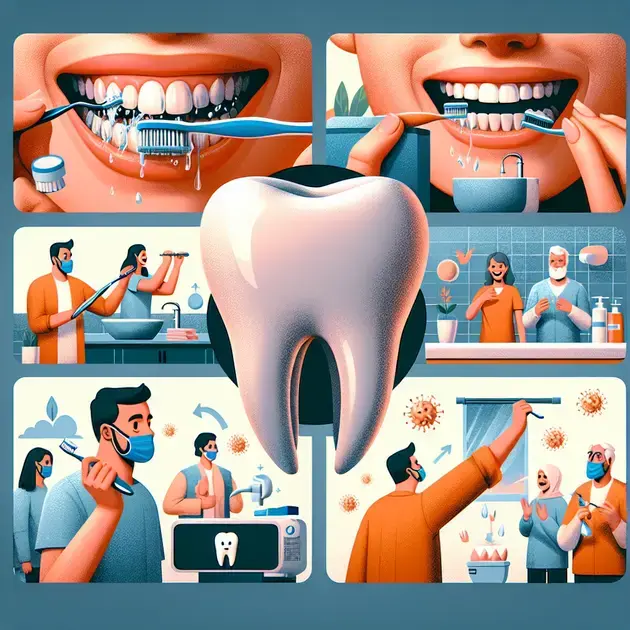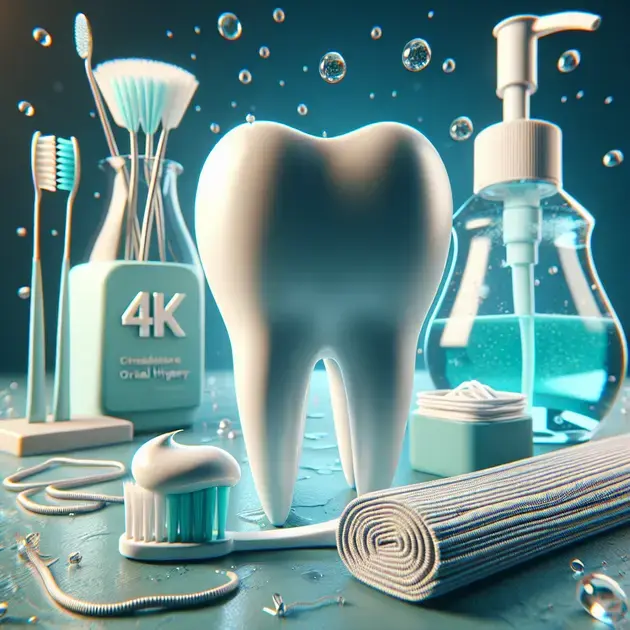Dealing with dental plaque is crucial for maintaining good oral health. Learning how to prevent and remove dental plaque on teeth is essential in preventing various dental issues such as cavities and gum disease.
According to recent studies, implementing proper oral hygiene practices is the key to effectively preventing and removing dental plaque. By incorporating regular brushing, flossing, and dental cleanings into your routine, you can significantly reduce plaque buildup on your teeth.

Prevent Dental Plaque Naturally
Dental plaque is a common issue that can lead to various oral health problems if not properly managed. Fortunately, there are natural ways to prevent the buildup of plaque on your teeth. By incorporating these practices into your daily routine, you can maintain a healthy and clean mouth without relying on harsh chemicals or treatments.
1. Proper Brushing Technique
One of the most effective ways to prevent dental plaque naturally is by practicing good oral hygiene. Make sure to brush your teeth at least twice a day using a fluoride toothpaste and a soft-bristled toothbrush. Pay close attention to all surfaces of your teeth, including the back molars and along the gumline. Consider using an electric toothbrush for more thorough cleaning.
2. Flossing Daily
In addition to brushing, flossing is essential for removing plaque and food particles from between your teeth. Make it a habit to floss once a day, preferably before bedtime. This helps prevent plaque from hardening into tartar, which can only be removed by a professional dental cleaning.
3. Mouthwash with Natural Ingredients
Using a mouthwash containing natural ingredients like tea tree oil or peppermint can help control plaque-causing bacteria in your mouth. Swish the mouthwash around for 30 seconds to a minute after brushing and flossing to further reduce plaque buildup.
4. Limit Sugary and Starchy Foods
Diet plays a significant role in dental health. Sugary and starchy foods can contribute to plaque formation, so it’s important to limit your intake of these items. Opt for crunchy fruits and vegetables instead, which can help clean your teeth naturally.
5. Regular Dental Check-ups
Visiting your dentist for regular check-ups and cleanings is crucial for maintaining good oral health. Your dentist can identify early signs of plaque buildup and provide professional advice on how to prevent it naturally. Schedule a dental appointment at least twice a year to stay on top of your oral hygiene.
Best Practices for Removing Dental Plaque
While prevention is key, sometimes plaque can still accumulate on your teeth despite your best efforts. Knowing the best practices for removing dental plaque can help you effectively maintain a clean and healthy smile. Here are some tips to help you tackle plaque buildup and protect your oral health.
1. Regular Professional Cleanings
One of the most effective ways to remove stubborn plaque is by scheduling regular professional cleanings with your dentist or dental hygienist. During these appointments, they will use special tools to remove plaque and tartar from hard-to-reach areas of your mouth.
2. Scaling and Root Planing
If you have significant plaque buildup and early signs of gum disease, your dentist may recommend scaling and root planing. This deep cleaning procedure involves scraping away plaque and tartar from the roots of your teeth to promote gum healing and prevent further plaque accumulation.
3. Use an Antimicrobial Mouthwash
After removing plaque, it’s important to maintain a clean mouth to prevent its return. Using an antimicrobial mouthwash recommended by your dentist can help kill bacteria and control plaque formation. Swish the mouthwash in your mouth for the recommended time to maximize its effectiveness.
4. Consider Dental Sealants
Dental sealants are a preventive measure that can protect your teeth from plaque buildup. These thin, plastic coatings are applied to the chewing surfaces of the back teeth to seal off pits and grooves where plaque can easily accumulate. Talk to your dentist about whether dental sealants are a good option for you.
5. Practice Good Overall Health
Maintaining good overall health can also contribute to better oral health. Make sure to eat a balanced diet, stay hydrated, get regular exercise, and manage stress effectively. These lifestyle factors can help reduce inflammation in the body, including the gums, and promote healthier teeth and gums.

Natural Remedies for Dental Plaque
Introduction
Dental plaque is a common issue that can lead to various dental problems if not properly addressed. While regular brushing and flossing are essential for oral hygiene, there are also natural remedies that can help combat dental plaque effectively.
Tea Tree Oil
Tea tree oil has natural antibacterial properties that can help reduce the growth of bacteria in the mouth, including the ones responsible for plaque formation. To use tea tree oil as a natural remedy for dental plaque, simply add a few drops to your toothpaste or mouthwash and use it regularly as part of your oral care routine.
Oil Pulling
Oil pulling is an ancient Ayurvedic practice that involves swishing oil around in your mouth to remove bacteria and promote oral health. Coconut oil is commonly used for oil pulling due to its antimicrobial properties. To try oil pulling, swish a tablespoon of coconut oil in your mouth for about 15-20 minutes before spitting it out and rinsing with water.
Neem
Neem, also known as Indian lilac, is a natural remedy with antibacterial properties that can help prevent plaque buildup. You can use neem twigs or neem-based toothpaste to benefit from its plaque-fighting effects. Neem also promotes overall gum health and freshens breath.
Green Tea
Green tea contains compounds that can help inhibit the growth of bacteria in the mouth, reducing the formation of plaque. Drinking green tea regularly can contribute to better oral health. You can also use cooled green tea as a mouth rinse to help control plaque-causing bacteria.
Dental Plaque Prevention Strategies
Introduction
Preventing dental plaque is key to maintaining good oral health and preventing issues like gum disease and tooth decay. By adopting effective prevention strategies, you can reduce the risk of plaque formation and promote a healthy smile.
Regular Dental Cleanings
Scheduling regular dental cleanings with a professional hygienist is crucial for removing plaque and tartar that regular brushing may miss. Aim to visit your dentist at least twice a year for thorough cleanings and check-ups to prevent plaque buildup.
Proper Brushing Technique
Brushing your teeth at least twice a day with fluoride toothpaste is essential for preventing plaque formation. Use a soft-bristled toothbrush and gentle, circular motions to effectively remove plaque from all surfaces of your teeth. Pay special attention to the gumline and back teeth where plaque tends to accumulate.
Healthy Diet
Avoiding sugary and sticky foods can help prevent plaque formation, as these can contribute to bacterial growth in the mouth. Instead, opt for a balanced diet rich in fruits, vegetables, and lean proteins to support overall oral health and reduce plaque buildup.
Use of Mouthwash
Antibacterial mouthwashes can help reduce plaque-causing bacteria in the mouth when used as part of your daily oral care routine. Look for mouthwashes that are specifically designed to fight plaque and gingivitis, and use them as directed for best results.
Daily Habits to Combat Dental Plaque
Introduction
Developing healthy daily habits is essential for combating dental plaque and maintaining optimal oral hygiene. By incorporating simple yet effective habits into your routine, you can reduce plaque buildup and protect your teeth and gums.
Flossing Daily
Flossing is a crucial step in removing plaque and food particles from between your teeth where toothbrush bristles cannot reach. Make it a habit to floss at least once a day, ideally before brushing your teeth, to ensure thorough plaque removal and prevent gum disease.
Limiting Sugary Snacks
Consuming sugary snacks and beverages can feed the bacteria in your mouth, leading to plaque formation and increased risk of cavities. Limit your intake of sugary foods and drinks, and if you do indulge, be sure to brush your teeth afterward to minimize plaque buildup.
Drinking Water
Water helps rinse away food particles and bacteria in the mouth, reducing the risk of plaque formation. Make it a habit to drink water throughout the day, especially after meals, to help keep your mouth clean and hydrated. Swishing water around in your mouth can also help dislodge plaque and debris.
Chewing Sugar-Free Gum
Sugar-free gum can stimulate saliva production, which helps neutralize acids in the mouth and rinse away bacteria and food particles. Chew sugar-free gum after meals to aid in plaque prevention and freshen your breath. Look for gum with xylitol, a natural sweetener that can inhibit bacterial growth.
Conclusion
Overall, addressing dental plaque is crucial for maintaining good oral health and preventing various dental issues. While regular brushing, flossing, and dental cleanings are fundamental, incorporating natural remedies like tea tree oil, oil pulling with coconut oil, neem, and green tea can enhance plaque-fighting efforts. These remedies possess antibacterial properties that combat plaque formation and promote gum health.
Prevention strategies such as practicing proper brushing techniques, maintaining a healthy diet, using antibacterial mouthwashes, flossing daily, limiting sugary snacks, drinking water, and chewing sugar-free gum are vital in reducing plaque buildup and supporting optimal oral hygiene. These habits help prevent bacterial growth, plaque accumulation, and the risk of gum disease and cavities.
By combining regular oral care practices with natural remedies and preventive strategies, individuals can effectively combat dental plaque, promote overall oral health, and achieve a brighter, healthier smile. Consistency in implementing these habits is key to reducing plaque formation, protecting teeth and gums, and supporting long-term oral well-being.